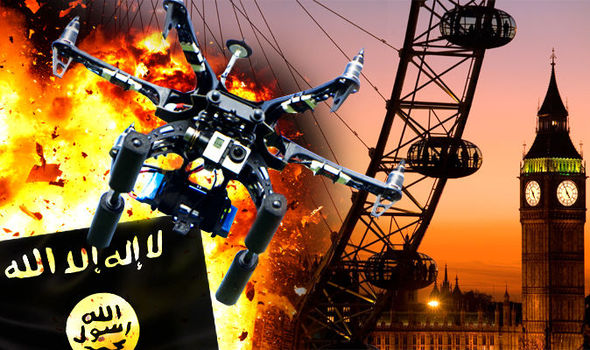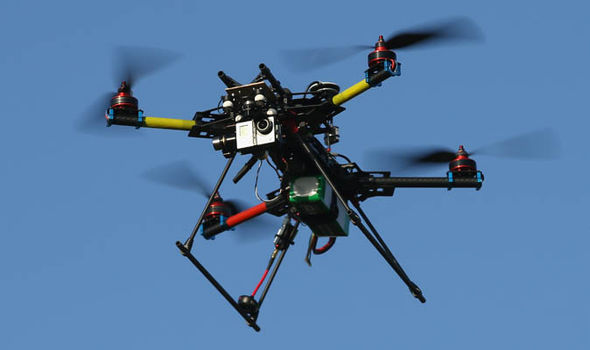Britain is ‘WOEFULLY unprepared for a terrorist drone attack and the threat is REAL’

EXCLUSIVE: A DRONE attack from Islamic State (ISIS) terrorists is a REAL possibility and Britain is “woefully” unprepared, a top security boss has claimed.
It is “only a matter of time” before crazed jihadis adapt an easy-to-use and affordable drone, which can be bought for as little as £100 from high street shops.
They are already being used by criminals and the British Airline Pilots Association even calling for “urgent action” to reduce their danger.
UK defence chiefs are also concerned ISIS will use a drone to commit atrocities on the streets of the UK, targetting large crowds at popular outdoor events such as football matches or music festivals.
We have already seen the threat drones can pose in Ukraine, where fighters or armed force are taking grenades and attaching them to drones

Security insider Andrew Wright
Now security insider Andrew Wright, who has more than 25 years experience in the industry, claims a drone attack could be a real possibility due to the lack of preparation and advancement in technology and ideology.
Mr Wight told Express.co.uk: “It is only a matter of time before a drone is used for terrorist purposes and we are concerned at the lack of available anti drone solutions. This is why we have developed an array of counter measures, to help people and businesses safeguard themselves against this threat.”
Terrorists are looking at new and emerging technology after seeing how emergency services are already prepared for a Paris or Mumbai-style attack.
Mr Wright doesn’t want a ban on drones, as they have use in search and rescue, inspection, camera work and a variety of other roles.
But he added: “Without up to date regulation and clear guidelines on where and when drones can be used, the possibility for misuse is expanding all the time.
“We have already seen the threat drones can pose in Ukraine, where fighters or armed force are taking grenades and attaching them to drones and effectively creating a guided missile for less than £500.
“In Syria, most of the footage you see of the damage done by ISIS is captured by drones.”
There have been a growing number of potentially catastrophic incidents involving drones in the last six months, including a collision with a British Airways passenger jet at Heathrow Airport.
Earlier this year, a report by the Remote Control project claimed drones could be used as “simple, affordable and effective airborne improvised explosive devices”, warning targets in Britain — from David Cameron’s car to high profile building and poltical embassies — could be attacked by these make-shift flying bombs.
Researchers from the project, which was hosted by the Oxford Research Group, analysed more than 200 shop or internet purchased drones and said: "The technology of remote-control warfare is impossible to control.”
Mr Wright says this perceived inability to contain and neutralise so-called remote controlled warfare is exactly why the British public could be put at risk.
He added: “If you look at recent viral internet footage shot by a man with a drone over London you can see that he managed to fly round the Shard, over Buckingham Palace and other key landmarks completely unchecked.
“In September 2013, German Chancellor Angela Merkel was buzzed by a drone as she gave a speech during a Christian Democratic Party campaign event.
“She just smiled, and her security guards had no reaction to it at all — even though they had no idea if it was a threat or not.”
The drone, which was operated by a member of the German Pirate Party as a protest against government surveillance, turned out not to be an attack, but Mr Wright says security officials should be more aware of the problems drone can pose.
Asked how Britain could tackle the so-called “hidden menace” he ordered for No Drone Zones to identify threats, and train staff at security locations.
He claims the UK now needs to implement a ”proactive” plan to tackle this threat to protect the public, MPs and other high profile figures.
In 2015, police forces in the UK were given advice on how to handle any incidents of people flying drones in public spaces.
The 28-page rulebook, which mostly focussed on hobbyists who may be accidentally causing danger by flying over groups of people, also warned there is a "concern" terrorists could use drone to "obtain information through hostile reconnaissance".
But Mr Wright says this is not enough, adding many other security forces are left blind when it comes to the threat of drones.
To that end, Mr Wright and his business partner Richard Gill have set up Drone Defence, the first and only drone proofing consultancy firm in the UK, aimed at protecting private companies, events, politicians and members of the public against this new menace from above.
The firm offers a number of measures used to combat drones — including net guns that pluck the devices out of the sky and a multi-sensor detection system using audio, video and infrared sensors to protect a specific location.
Политика конфиденциальности | Правила пользования сайтом








